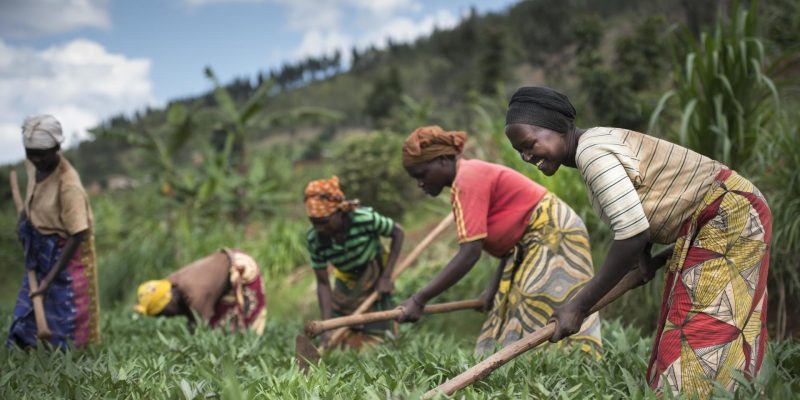Introduction:
As the world shifts towards more sustainable and inclusive development, it is becoming increasingly clear that gender-focused activities are not just a matter of social justice but are also crucial to driving growth in key sectors like renewable energy (RE), water, hygiene, and agriculture. In Central Africa, where access to these resources is limited, integrating gender diversity into operations can unlock significant economic potential and improve the overall impact of development projects. This blog explores the business case for gender diversity, highlights leading global practices, and provides actionable insights for seamlessly integrating gender equity across the energy, water, and agricultural sectors in Central Africa.

The Business Case for Gender Diversity:
Research shows that gender diversity in leadership and operations leads to better financial performance, greater innovation, and improved sustainability outcomes. In sectors like renewable energy, water, and agriculture, which are critical for Central Africa’s development, women play a pivotal role as both consumers and decision-makers. However, gender disparities in these sectors often prevent women from participating fully, limiting their economic empowerment and hindering the progress of these industries.
By promoting gender diversity and focusing on gender-inclusive policies, organizations can:
- Improve decision-making: Diverse teams bring a broader perspective, leading to more innovative solutions.
- Enhance community engagement: Women are often the primary managers of household energy and water resources, making their involvement key to the success of projects.
- Boost financial performance: Studies show that companies with higher levels of gender diversity outperform their peers in profitability and value creation.
Gender-Focused Initiatives in Central Africa:
In Central Africa, where rural communities face significant energy, water, and agricultural challenges, women are critical stakeholders in ensuring the success of development projects. Despite this, they are often underrepresented in decision-making roles and face barriers to entry into these sectors. By integrating gender-focused initiatives into these areas, Central Africa can drive both social and economic development.
1. Renewable Energy (RE):
Women, especially in rural areas, are disproportionately affected by energy poverty. Lack of access to clean energy sources leads to increased household burdens, time spent gathering fuel, and exposure to harmful pollutants from traditional fuels. By actively involving women in the renewable energy sector—both as users and leaders—there is a vast opportunity to promote gender equity while also improving energy access.
- Best Practice Example: In countries like Kenya and Rwanda, gender-focused solar energy programs have trained women as solar entrepreneurs, empowering them to sell, install, and maintain solar products. Central Africa can adopt similar programs to boost women’s participation in the renewable energy market.
2. Water and Hygiene:
Women are traditionally responsible for water collection and household hygiene in many Central African countries. This makes them key stakeholders in water access and sanitation projects. Gender-focused initiatives can ensure that women are involved in the planning, implementation, and management of water infrastructure, improving the sustainability and effectiveness of these projects.
- Best Practice Example: In Uganda, women’s participation in WASH (Water, Sanitation, and Hygiene) committees has led to improved water management systems and increased access to clean water. Central African countries can replicate such models, ensuring women have a voice in decision-making processes.
3. Agriculture:
In agriculture, women are the backbone of the workforce in Central Africa, yet they face significant barriers in accessing resources like land, credit, and technology. Gender-focused initiatives that support women farmers can enhance agricultural productivity and food security.
- Best Practice Example: In Nigeria, the Women Farmers Advancement Network (WOFAN) has trained over 10,000 women in modern farming techniques, leading to increased yields and better food security. Central African countries can benefit from similar gender-focused agricultural programs.
Integrating Gender Equity Across Operations:
To drive meaningful change and create a gender-inclusive energy, water, and agricultural sector in Central Africa, organizations must take proactive steps to integrate gender equity throughout their operations. This can be achieved by:
- Conducting Gender Audits: Assess existing policies and practices to identify areas where gender inclusion can be improved.
- Developing Gender-Responsive Programs: Design programs that specifically address the needs and roles of women in the sectors.
- Providing Gender-Sensitive Training: Train staff on gender equity issues, ensuring that all team members understand the importance of gender diversity in the workplace.
- Engaging Women as Leaders: Promote women into leadership positions to ensure they have a voice in decision-making processes.
Conclusion:
Gender-focused activities are essential to achieving sustainable development in renewable energy, water, hygiene, and agriculture in Central Africa. By embracing gender diversity and empowering women in these key sectors, organizations can improve project outcomes, boost financial performance, and create more inclusive communities. The future of Central Africa’s energy and agricultural sectors depends on integrating gender equity at every level.
Call to Action:
If you’re an organization looking to make your operations more gender-inclusive, or if you’re interested in learning more about how gender-focused initiatives can drive growth in Central Africa’s renewable energy, water, and agricultural sectors, contact ResourcePrime today. Together, we can create a more sustainable and gender-equitable future.
Email: info@resourceprime.com
Phone: +1 (812)220-0822